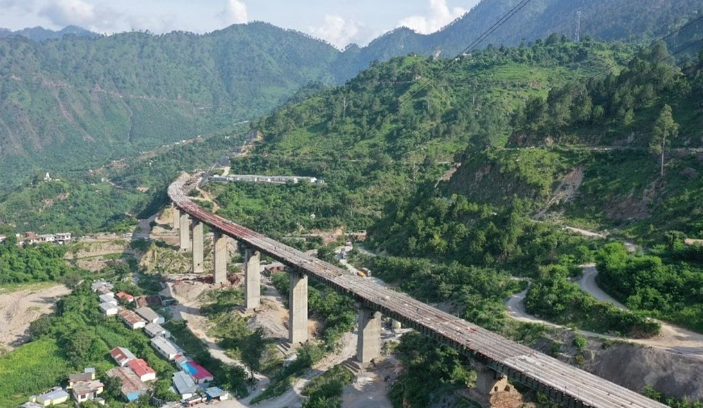Why the Katra Halt Challenges the Delhi-Srinagar Rail Project
By: Javid Amin
For decades, the idea of a seamless train journey from Delhi to Srinagar has captured the imagination of travelers, traders, and policymakers alike. However, the latest decision to mandate a halt and changeover at Katra has left many questioning the intentions behind this move. Is this a necessary safety measure, or does it reflect deeper political motivations? This article explores the implications, local reactions, and expert insights into why the Delhi-Srinagar rail project remains incomplete.
The Long-Awaited Promise of Connectivity
The direct rail link between Delhi and Srinagar has been touted as a game-changer for Jammu & Kashmir. It promised economic integration, ease of travel, and a boost to tourism and trade. However, the announcement that passengers would have to deboard at Katra and board a separate train has shattered hopes for a direct connection.
The Frustration of Changeover
The mandatory halt at Katra requires passengers to:
- De-board the train.
- Exit the station for re-screening.
- Reboard another train for the onward journey to Srinagar.
This cumbersome process has drawn criticism for being inconvenient and counterproductive to the original vision of seamless connectivity.
Local Leaders Speak Out
Altaf Bukhari: A Stand for Seamless Travel
Jammu & Kashmir Apni Party (JKAP) president, Altaf Bukhari, expressed his dissatisfaction, stating:
“The direct train was meant to bring relief and comfort. This changeover at Katra defeats the purpose. It’s troubling and humiliating for passengers.”
Bukhari urged railway authorities to reconsider, suggesting alternative measures for addressing safety concerns without inconveniencing travelers.
People’s Democratic Party (PDP): A Needless Burden
PDP General Secretary Mohammad Khurshid Alam criticized the decision as an “unnecessary hardship,” especially for the elderly and those traveling for medical treatment. Alam stated:
“This decision exposes Kashmiris to needless disruptions under the pretext of security. The promise of convenience has turned into another struggle.”
Is the Move Politically Motivated?
The timing and nature of this decision have raised eyebrows. Critics argue that the changeover reflects deeper political intentions, aimed at curbing accessibility to the valley. Others view it as part of a broader strategy to maintain centralized control over the region.
Analysis of Political Context:
- The project, announced with much fanfare, was seen as a symbol of national integration.
- Regional leaders allege that the inconvenience created by the Katra halt undermines the spirit of unity the rail link was supposed to foster.
- Speculations abound that this decision caters to political interests rather than logistical or safety concerns.
Safety Concerns: A Valid Justification?
Railway authorities have defended the changeover, citing security concerns in the region. The Jammu-Srinagar rail link passes through vulnerable terrains, raising potential risks. However, critics argue that:
- Security screenings can be conducted at the origin station, avoiding midway disruptions.
- The additional process at Katra appears excessive and impractical for travelers.
Impact on Local Sentiments and Tourism
The Katra halt threatens to dilute the project’s benefits:
- Tourism: A direct train was expected to bring tourists to the valley in greater numbers, boosting the local economy. The current arrangement may discourage travelers seeking convenience.
- Trade: Traders reliant on smooth logistics will face delays and increased costs.
- Public Sentiment: The changeover has deepened the perception of neglect and alienation among Kashmiris.
Voices from the Ground
Local newspapers have captured the discontent of residents and travelers alike:
- “This arrangement feels like a punishment for choosing to travel to Kashmir,” says one frequent traveler.
- “We were promised progress and convenience, but all we see are hurdles,” remarked a shopkeeper in Srinagar.
What Needs to Change?
Experts and political leaders propose several alternatives to address the issue:
- Enhanced Screening at Source: Implement robust security checks at Delhi to eliminate the need for a midway halt.
- Direct Trains with Monitoring: Equip trains with advanced surveillance systems to ensure safety during transit.
- Policy Transparency: Authorities must clarify whether the decision stems from logistical, political, or security concerns.
Bottom-line: A Dream That Must Not Fade
The Delhi-Srinagar rail project symbolizes hope, unity, and progress. However, the decision to mandate a Katra halt risks alienating the very people it was designed to serve. While safety concerns cannot be dismissed, they must be addressed without compromising the convenience and dignity of passengers.
For this dream to be realized, policymakers must prioritize seamless connectivity, transparent communication, and practical solutions. Only then can the Delhi-Srinagar rail link fulfill its promise as a bridge between regions and people.



